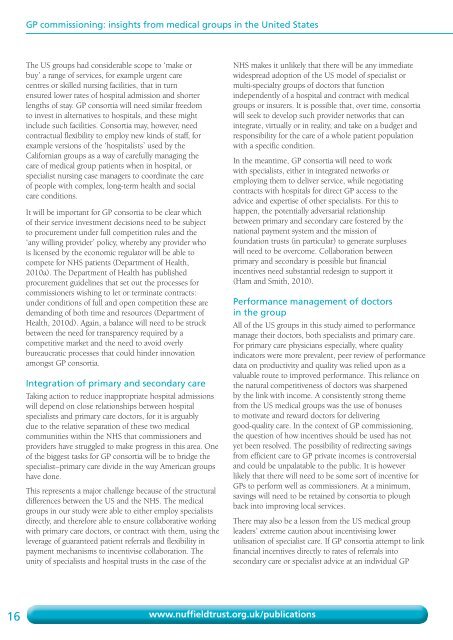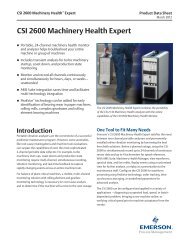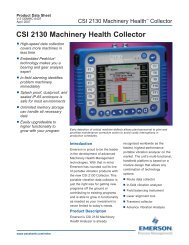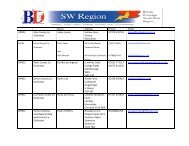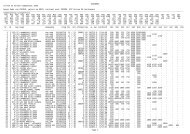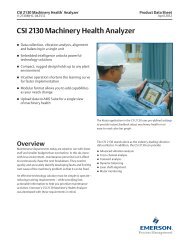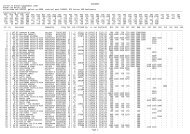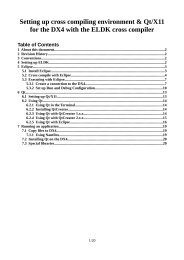Download Publication - The Nuffield Trust
Download Publication - The Nuffield Trust
Download Publication - The Nuffield Trust
You also want an ePaper? Increase the reach of your titles
YUMPU automatically turns print PDFs into web optimized ePapers that Google loves.
GP commissioning: insights from medical groups in the United States<strong>The</strong> US groups had considerable scope to ‘make orbuy’ a range of services, for example urgent carecentres or skilled nursing facilities, that in turnensured lower rates of hospital admission and shorterlengths of stay. GP consortia will need similar freedomto invest in alternatives to hospitals, and these mightinclude such facilities. Consortia may, however, needcontractual flexibility to employ new kinds of staff, forexample versions of the ‘hospitalists’ used by theCalifornian groups as a way of carefully managing thecare of medical group patients when in hospital, orspecialist nursing case managers to coordinate the careof people with complex, long-term health and socialcare conditions.It will be important for GP consortia to be clear whichof their service investment decisions need to be subjectto procurement under full competition rules and the‘any willing provider’ policy, whereby any provider whois licensed by the economic regulator will be able tocompete for NHS patients (Department of Health,2010a). <strong>The</strong> Department of Health has publishedprocurement guidelines that set out the processes forcommissioners wishing to let or terminate contracts:under conditions of full and open competition these aredemanding of both time and resources (Department ofHealth, 2010d). Again, a balance will need to be struckbetween the need for transparency required by acompetitive market and the need to avoid overlybureaucratic processes that could hinder innovationamongst GP consortia.Integration of primary and secondary careTaking action to reduce inappropriate hospital admissionswill depend on close relationships between hospitalspecialists and primary care doctors, for it is arguablydue to the relative separation of these two medicalcommunities within the NHS that commissioners andproviders have struggled to make progress in this area. Oneof the biggest tasks for GP consortia will be to bridge thespecialist–primary care divide in the way American groupshave done.This represents a major challenge because of the structuraldifferences between the US and the NHS. <strong>The</strong> medicalgroups in our study were able to either employ specialistsdirectly, and therefore able to ensure collaborative workingwith primary care doctors, or contract with them, using theleverage of guaranteed patient referrals and flexibility inpayment mechanisms to incentivise collaboration. <strong>The</strong>unity of specialists and hospital trusts in the case of theNHS makes it unlikely that there will be any immediatewidespread adoption of the US model of specialist ormulti-specialty groups of doctors that functionindependently of a hospital and contract with medicalgroups or insurers. It is possible that, over time, consortiawill seek to develop such provider networks that canintegrate, virtually or in reality, and take on a budget andresponsibility for the care of a whole patient populationwith a specific condition.In the meantime, GP consortia will need to workwith specialists, either in integrated networks oremploying them to deliver service, while negotiatingcontracts with hospitals for direct GP access to theadvice and expertise of other specialists. For this tohappen, the potentially adversarial relationshipbetween primary and secondary care fostered by thenational payment system and the mission offoundation trusts (in particular) to generate surpluseswill need to be overcome. Collaboration betweenprimary and secondary is possible but financialincentives need substantial redesign to support it(Ham and Smith, 2010).Performance management of doctorsin the groupAll of the US groups in this study aimed to performancemanage their doctors, both specialists and primary care.For primary care physicians especially, where qualityindicators were more prevalent, peer review of performancedata on productivity and quality was relied upon as avaluable route to improved performance. This reliance onthe natural competitiveness of doctors was sharpenedby the link with income. A consistently strong themefrom the US medical groups was the use of bonusesto motivate and reward doctors for deliveringgood-quality care. In the context of GP commissioning,the question of how incentives should be used has notyet been resolved. <strong>The</strong> possibility of redirecting savingsfrom efficient care to GP private incomes is controversialand could be unpalatable to the public. It is howeverlikely that there will need to be some sort of incentive forGPs to perform well as commissioners. At a minimum,savings will need to be retained by consortia to ploughback into improving local services.<strong>The</strong>re may also be a lesson from the US medical groupleaders’ extreme caution about incentivising lowerutilisation of specialist care. If GP consortia attempt to linkfinancial incentives directly to rates of referrals intosecondary care or specialist advice at an individual GP16www.nuffieldtrust.org.uk/publications


